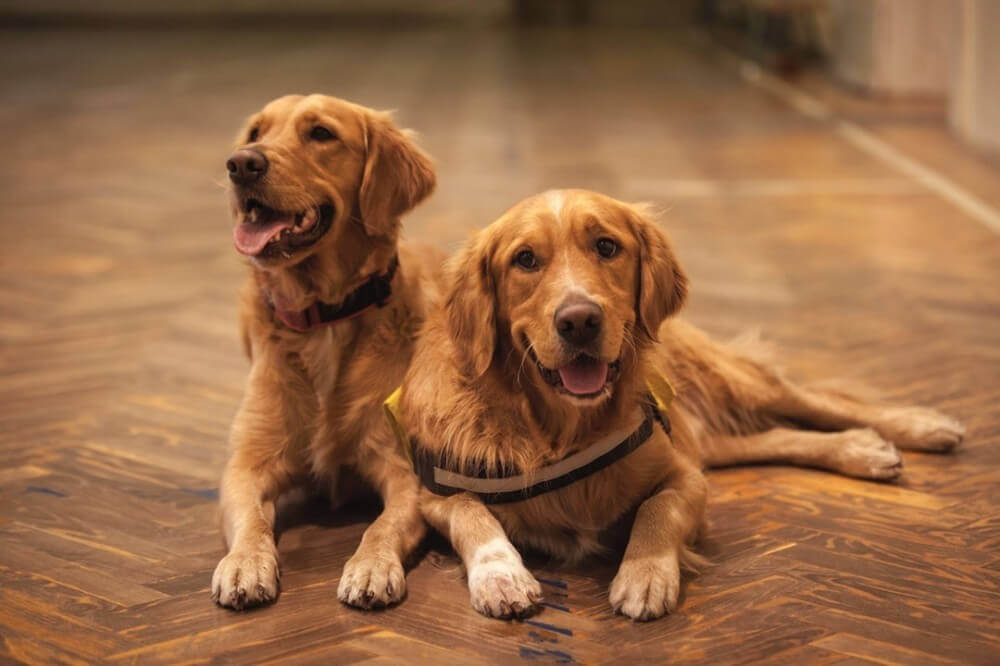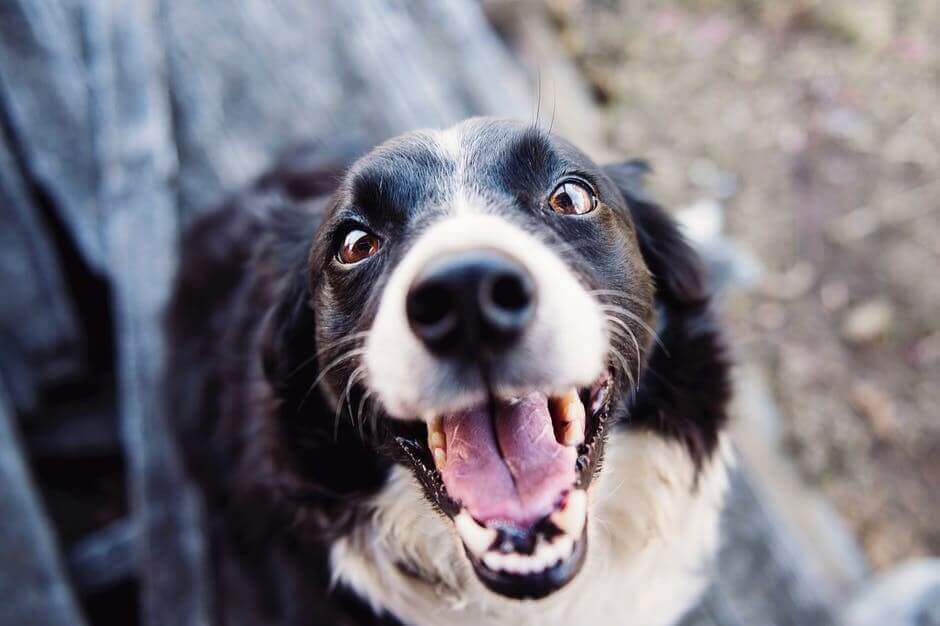December 18, 2019

Dogs are everywhere!
In fact, according to the American Veterinary Medical Association (AMVA), 36.5% of American households have a dog.
And I've seen them all.
From the tiniest toy dogs that fit in the palm of your hand to 200lb St. Bernards whose slobber is enough to drench the cat.
One of the most common questions I get:
"So, what's the best type of flooring for dogs?"
While certain kinds of flooring are better suited to most dogs, the more accurate answer is...
It all depends on your lifestyle!
When buying flooring for your home and dog, it's essential to understand what you're getting. That way, everybody wins - your home, dog, and yourself.
I've ranked each flooring type based on my overall experiences as a flooring specialist for over 19 years.
So here's what I'd like you to do....
After I walk you through each type of flooring, apply this information to your dog. That way, you will know which floor is right for you.
Okay, every type of flooring is going to have its pros and cons no matter what anyone tells you.
Yes, some are more suited to dogs, but overall, a one size fits all floor for dogs doesn't exist. It will depend on:

This is pretty straightforward.
Larger dogs tend to be tougher on floors than smaller ones because, well - everything they do is bigger.
They are heavier, pee more (although I have seen small dogs that pee like freak fire hydrants), shed more, their nails are bigger, drool more, and get sick, then they could literally puke the size of a small dog out.
Understanding this alone can save you a lot of future frustrations.
If you have a 10lb Pomeranian and you're concerned it's going to destroy your hardwood floors, it won't.
Now, if you have a 100lb goofy Weimaraner with talons that runs around your home like Bambi on ice, then that's another story.
Although I do flooring for a living, I have a real passion for dogs.
So I get somewhat disappointed when I see owners without a clue how to handle them.
Look, you know your dog best - does it behave or not?
Will it listen when verbally corrected? Or does it stare at you like you owe it money then goes back to tearing apart your carpet?
A well-balanced dog will respect you and your home and, as a result, your floors.
One that eats, pees, sleeps, and walks whenever and wherever it wants is a dog that's probably going to give you a lot more problems than just your floors.
If you want some help correcting any of your dog's "bad" behaviors, check out Adrienne Farricelli's training.
This is just basic common sense.
Don't live like a star from the series Hoarders.
Regularly maintain your floors based on what type it is and, if possible, follow the manufacturer's specifications. Surface dirt/dust is the leading cause of dulling your floor's appearance.
Other measures you can take to protect your floors:
Only use approved floor cleaners for regular maintenance.
| Porcelain | ||||
| Vinyl | apartments, rentals & certain homes |
|||
| Hardwood | ||||
| Laminate | ||||
| Carpet | ||||
| Cork |
This type of floor is specifically built to take a beating.
There's a very good reason why laminate manufacturers put dogs and kids in a lot of their advertising. That's precisely who it's made for.
We're talking soccer cleats, Tonka trucks, dogs, toys, and anything else an active lifestyle can throw at it.
It's true laminate flooring is significantly louder than hardwood since it is a floating floor. However, there are now superior laminate products and upgraded acoustic-type pads, so sound absorption is better than ever.
The main advantage of laminate flooring is you do not have to worry about what your dog will do to it.
It's:
Just make sure you get a reputable brand like Mannington, Shaw, or Mohawk.
The cheap/budget brands, quite frankly, aren't worth the money paid for them.
The main disadvantage is it is noticeably louder than glue-down products. Also, your dog may find it slippery if they love to run around your home. If this is a concern for you, avoid it or look into a textured option.
Otherwise, enjoy the show! 🙂
Textured / hand-scraped products mimic natural wood and offer you and your dog better traction than the traditional smooth finish.
So today's laminate does not only look like natural wood; they act like it too.
Recommended for: Any dog alive.
I want you to completely forget about everything you have known about vinyl floors in the past. They are the fastest-growing market segment in the flooring industry today!
Why?
Because they have come a long way in terms of looks, style, technology, and overall performance.
They are now the go-to choice for many contractors and homeowners alike regarding furnishing homes, apartments, townhomes, retail stores, and many other applications.
They come in many different styles, but the most popular right now are luxury vinyl planks (LVP) and luxury vinyl tiles (LVT).
Vinyl flooring for dogs brings a lot of advantages. They are:
Water, pee, vomit, drool, or feces won't do a darn thing to them.
I have installed plenty of this stuff all over Dallas-Fort Worth in both commercial and residential settings, and it's worked out just fabulous for the client.
It's not all sunshine and rainbows, however.
While putting vinyl plank flooring in your home may be great for you and your dog, the value of your home will not increase in any way. Just do your homework first, but if this is not an issue, then this is an excellent floor for any dog.
Luxury vinyl flooring comes in two categories:
I highly recommend going for a WPC over an SPC because it has more "give" and not as hard on the joints. Stone composites are specifically made for commercial applications, so they're considerably harder underfoot.
They come in both glue down and click products, the click going in most residential homes.
Recommended for: Light dogs, dogs whose nails are regularly trimmed, and well-behaved pups who would rather dig outside than inside.

One of the biggest issues that I encounter is dogs and hardwood flooring - more specifically, large dogs who run in the house!
Homeowners often ask me if their dog will scratch their wood floors.
If they are old, calm, or casually lumber around the house, then no. It will be doubtful they are going to scratch your wood floors.
However, if they are very high energy and act like they are on crack, then yes, their nails will scratch your wood floors.
Most dogs do very well with hardwood floors so long as their nails are maintained, and they are reasonably well behaved.
Being a natural product, all hardwood will eventually scratch; it's just a matter of when.
Think of it this way - if your bundle of joy is running on your wood floor, at one point in time when it's built up enough momentum, all of its weight is resting on its front nails. That's a lot of weight digging into the floor.
There's plenty of upside, though, to wood floors.
The harder species like hickory, maple, pecan, and Brazilian family (teak, walnut, and cherry) are more resilient than most other woods.
Quick Tip: Hand-scraped/distressed wood floors tend to hide imperfections a lot better than smooth finish or glossy ones.
Since the wear layer of wood flooring, whether engineered or solid, contains a protective wear layer by way of aluminum oxide or polyurethane, they don't absorb pet accidents like carpet does, so they're super easy to clean up.
Wood floors are also hypoallergenic and do not absorb dust and dog hair like carpet does, so they're much easier to keep looking newer for longer. Plus, they add good value to your home.
Recommended for: Small-medium dogs, dogs whose claws are regularly trimmed, and well-behaved pups who would rather dig outside than inside.
4 & 5. Tile & Stone Flooring
Let me make a very clear distinction between tile and natural stone. Both of them are vastly different materials and behave very differently when it comes to dogs.
Glazed porcelain tile is the most indestructible flooring you can buy.
It wouldn't matter if you had a herd of stallions. The worst thing your dog could do to this kind of floor is stain the grout lines.
You can even minimize that by making the grout lines as small as possible. Just talk to your installer about the narrowest width for your tile. Make sure to seal them afterward or use pre-sealed grout.
Nothing goes wrong with this type of floor due to its exceptionally dense and hard properties. It's fired at a very high temperature, so the result is a product that's not only hard but impervious to moisture. Its water absorption rate is so low; some are even frostproof.
It's virtually impossible to scratch, stain, or damage.
I used to demonstrate this by running a screwdriver across the tile, and clients would see the sparks flying, yet not a scratch would appear on its surface.
Your dog will not hurt a glazed porcelain tile.
They install this type of material in shopping malls and airports, so that should give you an idea of just how resilient it is. It's also super easy to clean, providing the surface is somewhat smooth.
As visually stunning as it can be, natural stone, on the other hand, is a different story.
It's relatively soft, porous, and susceptible to damage.
It absorbs everything, so unless your floor is very well sealed, I wouldn't recommend this kind of floor for dogs with weak bladders and stomachs. They can easily scratch or stain it, and once their vomit or pee has penetrated the stone, you will need to replace that tile because it's not coming out.
We both know high-quality natural stone is not cheap!
Both materials are relatively hard on both human and dog joints. Hence, if your dog has arthritis and you get this kind of floor, be sure to furnish plenty of area rugs and give them their own allocated beds or adequately cushioned area to lay down on.
Glazed Porcelain Recommended for: Any healthy dog with no joint issues.
Natural Stone Recommended for: NOT RECOMMENDED.
6. Carpet
Ok, on the face of it, this option appears to be the very worst for dog owners, especially if their dog pees and/or vomits a lot since it absorbs pretty quickly.
A low-grade carpet is the worst possible flooring for dogs, no doubt about it. They easily stain it and chew it like a toy.
However, better quality carpets like Mohawk's stain-proof SmartStrand have no exclusion warranties on them, meaning they cover items typically not covered by lower grades.
Things such as...pet vomit, pet urine, blood, and other things you hope don't visit your carpet anytime soon. It is by far the most comprehensive pet protection warranty in the industry.
Also, never underestimate the value of a high-quality carpet shampooer.
Take a look at the very best ones and read the reviews of dog owners who managed to get every last trace of their pet accidents out with their cleaner. The accompanying pictures in those reviews are very impressive.
I can personally attest to how great these cleaners are in returning carpets to pristine condition. It just takes regular maintenance, and you'll be okay.
A good carpet cleaner will also extract all remaining remnants of impurities from the carpet backing, so it doesn't leak into the carpet pad. Once that happens, you pretty much have to replace your carpet.
When the pad gets soaked with pet urine and other contaminants, the smell can be so bad; it punches you right in the face!
If you're going down this route, get a stain-proof carpet like the one mentioned above and insist on a pet pad that contains a moisture barrier that prevents any accidents from getting into the pad.
The main advantages of carpet
The downside of carpet is it absorbs more dirt, debris, and stains than other types of flooring and is harder on those with allergies since it holds more dust.
Recommended for: Dogs that are house trained, have minimal health issues, and shed little.

7. Cork Flooring
Cork flooring for some dogs is an excellent choice - it's softer than any other floor except carpet and has more give than other surfaces. Hence, it's easy on the joints, super easy to clean, hypoallergenic, and very eco-friendly.
Because it's a softer material, it's pleasant to walk on, having a very light underfoot vibe to it. This makes it perfect for elderly folks and dogs with joint problems.
It's also suitable for any small dog since they are not heavy enough to cause any significant damage.
Its natural acoustic properties also allow it to absorb sound a lot better than other flooring types. So if peace and quiet are what you're after, you won't get a better floor.
Its properties also give it a built-in temperature control quality about it - it absorbs heat readily in the winter so it's noticeably warmer than tile or laminate but surprisingly cooler in summer.
This is due to it wanting to remain at room temperature.
The major drawback, of course, is cork is very soft and easily damaged. Not only by larger, more active dogs but from everyday wear and tear like moving furniture, equipment like wheelchairs and walking aides, high heels, and even a stone caught in the shoe can dent it.
Manufacturers have caught onto this major concern. So what you see now is a good portion of cork made today are heavily distressed and patterned to disguise imperfections in the floor once it's installed.
Overall, not the ideal floor for larger dogs, but it has its particular purpose for smaller ones.
Recommended for: Smaller dogs with relatively sedentary owners who entertain little.
There's no one-size-fits-all when it comes to flooring and your dog.
I've ranked them in order of what I felt was overall performance vs. value for money.
Of course, there are flooring types more suited to dogs than others, so it's going to get down to your circumstances and the kind of dog you have.
If I had to choose, I'd rank laminate flooring slightly ahead of the vinyl plank as the best flooring for dogs. Vinyl's waterproof properties, however, may put it ahead in many folk's eyes.
Stay clear of natural stone like marble and slate as these will give you a lot of problems.
Your dogs will pee, puke and shit all over them, and it'll be impossible to remove any stains. The only way to get rid of such accidents is to replace the tile, and you don't want to be constantly doing that.
Although laminate is loud and can be slippery, this can be offset by purchasing a higher quality acoustic pad and laminate product.
It also handles any dog, and household demands well, all while looking fabulous and lasting longer. Take this overall assessment based on trends and observations rather than specific recommendations.
In the end, you know your home and dog best.
Use good practice and commonsense like cleaning your floors with approved cleaners and trimming your dog's nails. Do that, and your floor will perform the way it was designed.
I hope this guide has helped you set your course for your new flooring purchase.
If you are in the Dallas / Fort Worth area and would like an estimate on your project, please connect with me here.